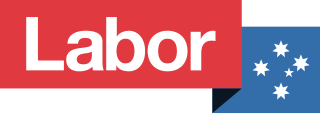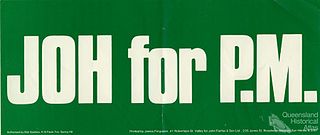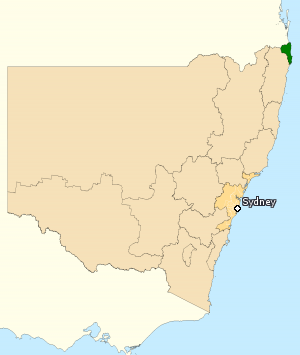Related Research Articles

The Australian Labor Party (ALP), also known simply as Labor or the Labor Party, is the major centre-left political party in Australia and one of two major parties in Australian politics, along with the centre-right Liberal Party of Australia. The party has been in government since the 2022 federal election, and with political branches active in all the Australian states and territories, they currently hold government in New South Wales, South Australia, Victoria, Western Australia, and the Australian Capital Territory. As of 2024, Queensland, Tasmania and Northern Territory are the only states or territories where Labor currently forms the opposition. It is the oldest continuous political party in Australian history, having been established on 8 May 1901 at Parliament House, Melbourne; the meeting place of the first Federal Parliament.
The National Party of Australia, commonly known as the Nationals or simply the Nats, is a centre-right and agrarian political party in Australia. Traditionally representing graziers, farmers, and rural voters generally, it began as the Australian Country Party in 1920 at a federal level.

Andrew Sharp Peacock was an Australian politician and diplomat. He served as a cabinet minister and went on to become leader of the Liberal Party on two occasions, leading the party to defeat at the 1984 and 1990 elections.

William George Hayden was an Australian politician who served as the 21st governor-general of Australia from 1989 to 1996. He was Leader of the Labor Party and Leader of the Opposition from 1977 to 1983, and served as Minister for Foreign Affairs and Trade from 1983 to 1988 under Bob Hawke and as Treasurer of Australia in 1975 under Gough Whitlam.

John Douglas Anthony was an Australian politician. He served as leader of the National Party of Australia from 1971 to 1984 and was the second and longest-serving deputy prime minister, holding the position under John Gorton (1971), William McMahon (1971–1972) and Malcolm Fraser (1975–1983).

Ian McCahon Sinclair is an Australian former politician who served as a Member of Parliament for 35 years, and was leader of the National Party from 1984 to 1989. He served as either a minister or opposition frontbencher for all but a few months from 1965 to 1989, and later Speaker of the House of Representatives from March to August 1998.

The 1996 Australian federal election was held to determine the members of the 38th Parliament of Australia. It was held on 2 March 1996. All 148 seats of the House of Representatives and 40 seats of the 76-seat Senate were up for election. The centre-right Liberal/National Coalition led by Opposition Leader John Howard of the Liberal Party and coalition partner Tim Fischer of the National Party defeated the incumbent centre-left Australian Labor Party government led by Prime Minister Paul Keating in a landslide victory. The Coalition won 94 seats in the House of Representatives, which is the largest number of seats held by a federal government to date, and only the second time a party had won over 90 seats at a federal election.

The Joh for Canberra campaign, initially known as the Joh for PM campaign, was an attempt by Queensland National Party premier Sir Joh Bjelke-Petersen to become Prime Minister of Australia. The campaign was announced in January 1987 and drew substantial support from Queensland businessmen and some conservative politicians. The campaign caused a split in the federal Coalition. It did not attract widespread support and collapsed in June 1987. The Australian Labor Party, led by Bob Hawke, went on to win the 1987 federal election with an increased majority, gaining its highest-ever number of seats. Bjelke-Petersen came under increasing scrutiny as the Fitzgerald Inquiry gained traction, and was forced out of politics altogether in December 1987.

The Liberal–National Coalition, commonly known simply as the Coalition or the LNP, is an alliance of centre-right to right-wing political parties that forms one of the two major groupings in Australian federal politics. The two partners in the Coalition are the Liberal Party of Australia and the National Party of Australia. Its main opponent is the Australian Labor Party (ALP); the two forces are often regarded as operating in a two-party system. The Coalition was last in government from 2013 to 2022. The group is led by Peter Dutton, who succeeded Scott Morrison after the 2022 federal election.

The Division of Richmond is an Australian electoral division in the state of New South Wales.

John Charles Kerin was an Australian economist and Labor Party politician who served in the House of Representatives from 1972 to 1975 and again from 1978 to 1993. He held a number of senior ministerial roles in both the Hawke and Keating governments, including six months as Treasurer of Australia and eight years as Minister for Primary Industries and Energy, holding the latter role for the longest period in Australian history.
The following lists events that happened during 1990 in Australia.

The 1990 Australian federal election was held in Australia on 24 March 1990. All 148 seats in the House of Representatives and 40 seats in the 76-member Senate were up for election. The incumbent Australian Labor Party, led by Bob Hawke, defeated the opposition Liberal Party of Australia, led by Andrew Peacock, with its coalition partner, the National Party of Australia, led by Charles Blunt, despite losing the nationwide popular and two-party-preferred vote. The result saw the re-election of the Hawke government for a fourth successive term, the first time the ALP had won four consecutive terms.
The following lists events that happened during 1987 in Australia.

The 1987 Australian federal election was held in Australia on 11 July 1987, following the granting of a double dissolution on 5 June by the Governor-General Sir Ninian Stephen. Consequently, all 148 seats in the House of Representatives as well as all 76 seats in the Senate were up for election. The incumbent Australian Labor Party, led by Prime Minister Bob Hawke, defeated the opposition Liberal Party of Australia, led by John Howard and the National Party of Australia led by Ian Sinclair. This was the first, and to date only, time the Labor Party won a third consecutive election.

The 1983 Australian federal election was held in Australia on 5 March 1983. All 125 seats in the House of Representatives and all 64 seats in the Senate were up for election, following a double dissolution. The incumbent Coalition government which had been in power since 1975, led by Malcolm Fraser and Doug Anthony, was defeated in a landslide by the opposition Labor Party led by Bob Hawke.
Neville Joseph Newell is an Australian politician. He served as a member of the Australian House of Representatives from 1990 until 1996 and as a member of the New South Wales Legislative Assembly from 1999 to 2007.
The history of the Australian Labor Party has its origins in the Labour parties founded in the 1890s in the Australian colonies prior to federation. Labor tradition ascribes the founding of Queensland Labour to a meeting of striking pastoral workers under a ghost gum tree in Barcaldine, Queensland in 1891. The Balmain, New South Wales branch of the party claims to be the oldest in Australia. Labour as a parliamentary party dates from 1891 in New South Wales and South Australia, 1893 in Queensland, and later in the other colonies.
The leader of the National Party of Australia is elected by majority vote of the federal parliamentary party. A deputy leader is elected in the same fashion. The party's longest-serving leader is Earle Page, who held the office from 1921 to 1939. The party's current leader is David Littleproud, who has held this office since 2022. It is historically rare for the incumbent leader and deputy leader to be opposed in a bid for re-election.

The National Party of Australia – Queensland (NPA-Q), commonly known as the Queensland Nationals, National Party of Queensland or simply the Nationals, was the Queensland branch of the National Party of Australia (NPA) until 2008. Prior to 1974, it was known as the Country Party. The party was disestablished in 2008, when it merged with the Queensland division of the Liberal Party of Australia to form the Liberal National Party of Queensland (LNP).
References
- ↑ Hawker back in his stamping ground: SMH 17 November 2004
- ↑ A Country Road: The Nationals, Episode 2